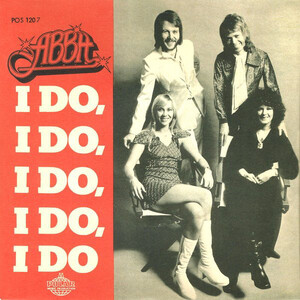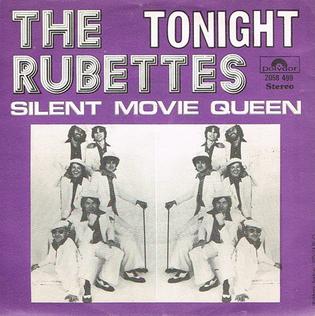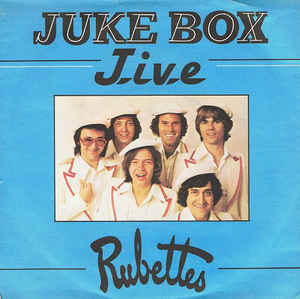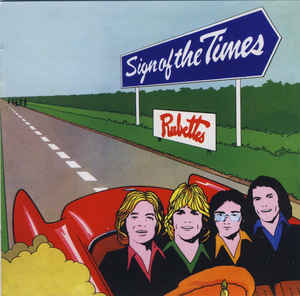
The Rubettes are an English pop/glam rock band put together in 1974 after the release of "Sugar Baby Love", a recording assembled of studio session musicians in 1973 by the songwriting team of Wayne Bickerton, the then head of A&R at Polydor Records, and his co-songwriter, Tony Waddington after their doo-wop and 1950s American pop-influenced songs had been rejected by a number of existing acts. Waddington paired the group with manager John Morris, the husband of singer Clodagh Rodgers and under his guidance, the band duly emerged at the tail end of the glam rock movement, wearing trademark white suits and cloth caps on stage. Their first release, "Sugar Baby Love" was an instant hit remaining at number one in the United Kingdom for four weeks in May 1974, while reaching number 37 on the US chart that August, and remains their best-known record. Subsequent releases were to be less successful, but the band continued to tour well into the 2000s with two line-ups in existence.

"Nothing Else Matters" is a power ballad by American heavy metal band Metallica. It was released in 1992 as the third single from their self-titled fifth studio album, Metallica. The song peaked at number 11 on the Billboard Mainstream Rock Tracks chart, number 6 on the UK Singles Chart, number 1 in Denmark, and reached the top ten on many other European charts. Recognized as one of Metallica's best known and most popular songs, it has become a staple in live performances.

"Nights on Broadway" is a song by the Bee Gees from the Main Course album released in 1975. The second single released from the album, it immediately followed their number-one hit "Jive Talkin'". This track was credited to Barry, Robin and Maurice Gibb.

"Jive Talkin'" is a song by the Bee Gees, released as a single in May 1975 by RSO Records. This was the lead single from the album Main Course and hit number one on the Billboard Hot 100; it also reached the top-five on the UK Singles Chart in the middle of 1975. Largely recognised as the group's comeback song, it was their first US top-10 hit since "How Can You Mend a Broken Heart" (1971).

"Get Down Tonight" is a song released in 1975 on the self-titled album by the disco group KC and the Sunshine Band. The song became widely successful, becoming the first of their five No. 1 hits on the Billboard Hot 100. It also reached the top of the Hot Soul Singles chart and was an international chart hit, reaching No. 1 in Canada and charting in Australia, Belgium, the Netherlands, and the UK.

"I Do, I Do, I Do, I Do, I Do" is a song by Swedish pop group ABBA. It was the third single to be released from their third studio album, ABBA (1975). The song was written by Benny Andersson, Björn Ulvaeus and their manager Stig Anderson, and was released in April 1975 with "Rock Me" as the B-side.

"Sugar Baby Love", recorded in autumn 1973 and released in January 1974, is a bubblegum pop song, and the debut single of the Rubettes. Written by Wayne Bickerton and Tony Waddington and produced by Bickerton, engineered by John Mackswith at Lansdowne Recording Studios, and with lead vocals by Paul Da Vinci, "Sugar Baby Love" was the band's only number one single on the UK Singles Chart, spending four weeks at the top of the chart in May 1974.

"Down Down" is a song by English rock band Status Quo, released by Vertigo Records on 29 November 1974. Written by Francis Rossi and Bob Young and produced by Status Quo, "Down Down" was Status Quo's only number one single on the UK Singles Chart. The single spent a week at the top of the chart in January 1975. Both "Down Down" and its B-side "Nightride" were taken from the album On the Level (1975), which had yet to be released. The album version lasts 5 minutes and 24 seconds, whilst the single version is 3 minutes and 49 seconds.

"Shame, Shame, Shame" is a 1974 hit song written by Sylvia Robinson, performed by American disco band Shirley & Company and released on the Vibration label. The female vocalist is Shirley Goodman, who was one half of Shirley & Lee, who had enjoyed a major hit 18 years earlier, in 1956, with the song "Let The Good Times Roll" for Aladdin Records. The male vocalist is Jesus Alvarez. The saxophone solo is by Seldon Powell, whose instrumental version, "More Shame", is the B-side.
Paul Da Vinci is a British singer and musician. He is best known as the lead singer on the 1974 hit recording by the Rubettes, "Sugar Baby Love", although he did not perform with the group at the time. He worked as a demo and session singer before and after his own successful solo career, that included "Your Baby Ain't Your Baby Anymore", which peaked at number 20 in the UK Singles Chart in August 1974 and number 54 in Australia. In the 1980s, Da Vinci sang most of the voices backing and lead on the Tight Fit hit "Back to the Sixties, Part 2", and performed on Top of the Pops with the group.
Wayne Bickerton was a British record producer, songwriter and music business executive. He became well known, with Tony Waddington, as writer and producer of a series of UK chart hits in the 1970s for The Rubettes, and as a leading figure in SESAC – one of the three major American performing rights organisations.

"I Love Rock 'n' Roll" is a rock song written by Alan Merrill and Jake Hooker and first recorded by the Arrows, a British rock band, in 1975. A 1981 cover version by Joan Jett & the Blackhearts, released as the first single from her album of the same name, became Jett's highest-charting hit, reaching number one on the Billboard Hot 100 and becoming the No. 3 song for 1982. The single was certified platinum by the Recording Industry Association of America, representing two million units shipped to stores. Jett's version was inducted into the Grammy Hall of Fame in 2016.

State Records is a British independent record label, established by Wayne Bickerton, Tony Waddington and John Fruin in 1975. The label released hits by many successful artists including the Rubettes, Mac & Katie Kissoon and Delegation.
Anthony Brandon Joseph Waddington is an English singer-songwriter, record producer, film producer, screenplay writer, and creative media executive. He became well known with Wayne Bickerton, as writer and producer of a series of UK chart hits in the 1970s for The Rubettes. He also received an Ivor Novello Award as "Songwriter of the Year".

We Can Do It is the second studio album by the English pop band The Rubettes, released on the State Records label in March 1975. The album reached no 41 in the UK charts and contained two UK top 10 hits – "I Can Do It" and "Juke Box Jive".

Wear It's 'At is the debut album by English pop band the Rubettes assembled in 1973 by the songwriting team of Wayne Bickerton, then the head of A&R at Polydor Records, and his co-songwriter, Tony Waddington, after their doo-wop and 1950s American pop-influenced songs had been rejected by a number of existing acts. Tracks from this album also exhibited the doo-wop style. The album title was a reference to the group's wearing trademark white suits and white cloth caps on stage, a white cap being shown on the album front cover.

Rubettes is the third studio album by the English pop band The Rubettes, released on the State Records label in November 1975, their third studio album release within 12 months. It was the last Rubettes album produced by Wayne Bickerton and Tony Waddington.The album contained two UK top 40 hits - Foe Dee O Dee and Little Darling.
In 1992, Dice Records (France) released the Rubettes' third and fourth albums as a double CD set. In 2015, Caroline Records released the album Rubettes, with three bonus tracks, as part of a box CD set of the Rubettes' first five studio albums.

"Tonight" was the second single released by The Rubettes from their debut album Wear It's 'At. Written by Wayne Bickerton and Tony Waddington and produced by Bickerton, the single reached number 12 in the UK charts.

"Juke Box Jive", by English band The Rubettes, was the lead single from their second album We Can Do It. As with their two previous singles, it was written by the songwriting team of Wayne Bickerton and Tony Waddington and produced by Bickerton. The single reached number 3 in the UK charts.

Sign of the Times is the fourth studio album by the English band The Rubettes. It was released on the State Records label in June 1976. The album represented a significant change in direction for the band, as it was the first not produced by Wayne Bickerton and Tony Waddington – instead the Rubettes took on production responsibilities themselves, with Alan Blakley as co-producer. The band made the decision due to the disappointing sales of their previous two Bickerton/Waddington singles and the desire to forge new musical directions.

















